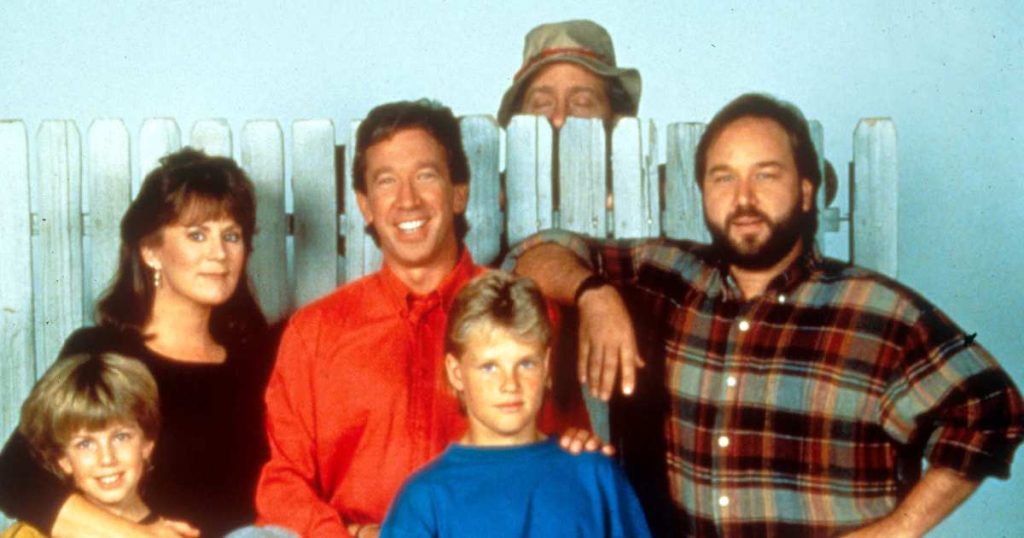“Home Improvement,” a cornerstone of 1990s television comedy, captivated audiences with its portrayal of the quintessential American family, the Taylors. The series, which ran for eight successful seasons on ABC from 1991 to 1999, centered around Tim “The Toolman” Taylor, a lovable but accident-prone host of the fictional home improvement show “Tool Time.” Tim’s bungling attempts at DIY projects, often exacerbated by his penchant for “more power,” provided the show’s central comedic engine. His long-suffering yet supportive wife, Jill, and their three sons, Brad, Randy, and Mark, rounded out the family dynamic, offering a relatable depiction of suburban life with its inherent chaos and heartwarming moments. The show’s success catapulted Tim Allen, who portrayed the titular Toolman, to stardom, solidifying his place as a comedic icon.
Tim’s onscreen chemistry with his “Tool Time” co-host and best friend, Al Borland, played by Richard Karn, became a hallmark of the series. Al’s calm demeanor and practical know-how served as the perfect foil to Tim’s impulsive and often disastrous approach to home improvement. Their contrasting personalities and witty banter resonated with viewers, creating a dynamic duo that became synonymous with the show’s success. Beyond the comedic mishaps on “Tool Time,” the series also explored the complexities of family life, tackling relatable issues such as sibling rivalry, parenting challenges, and the evolving dynamics of marriage. The Taylor household, while often boisterous and chaotic, ultimately embodied the enduring strength and love that binds families together.
The show’s popularity extended beyond its central characters, with recurring roles and guest appearances contributing to its enduring appeal. Wilson Wilson, Jr., the Taylors’ wise and enigmatic neighbor, played an integral role, offering sage advice and philosophical insights from behind his ever-present fence. His hidden face became a running gag, adding a touch of mystery and humor to the series. The show also benefited from the burgeoning career of Jonathan Taylor Thomas, who played middle son Randy. Thomas’s popularity soared during the show’s run, making him a teen idol and further boosting the show’s ratings. However, his decision to leave the show during the eighth season to focus on his education marked a significant turning point for “Home Improvement.”
Despite offers of substantial financial incentives, both Tim Allen and Patricia Richardson, who played Jill Taylor, declined to participate in a ninth season. This decision, while disappointing to fans, solidified the show’s legacy at its peak, preserving the integrity of the original cast and storyline. While the show concluded its run in 1999, its impact on popular culture continues to resonate. “Home Improvement” became a cultural touchstone, influencing subsequent sitcoms and solidifying its place in television history. The show’s enduring popularity speaks to its ability to connect with audiences on a deeper level, tapping into the universal themes of family, friendship, and the humorous challenges of everyday life.
In the years following the show’s conclusion, fans have eagerly anticipated a reunion or revival. Tim Allen, in a 2020 interview, expressed his enthusiasm for revisiting the Taylor family, suggesting a one-off movie format that would explore the characters’ lives in the present day. The idea of a “Tool Time” segment set in the modern era, incorporating current technology and trends, further fueled fans’ excitement. While a reunion remains a possibility, the logistics of bringing the cast back together, given their diverse career paths and individual commitments, present a significant challenge. Nevertheless, the enduring popularity of “Home Improvement” and the continued interest from both the cast and fans hold out hope for a future glimpse into the lives of the beloved Taylor family.
The enduring appeal of “Home Improvement” lies in its ability to capture the essence of family life with both humor and heart. The show’s relatable characters, witty dialogue, and exploration of everyday challenges resonated with audiences of all ages. While the show’s run came to an end, its impact on television comedy remains undeniable, leaving a lasting legacy that continues to entertain and inspire. The possibility of a reunion offers a tantalizing glimpse into the future, holding out hope for a nostalgic return to the world of Tim “The Toolman” Taylor and his unforgettable family. The show’s enduring popularity serves as a testament to its timeless themes and its ability to connect with audiences on a deeply personal level, making it a true classic of 1990s television.










